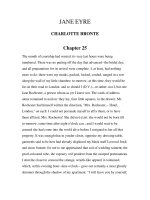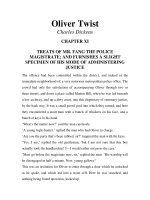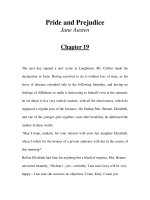LUYỆN ĐỌC TIẾNG ANH QUA TÁC PHẨM VĂN HỌC-SHORT STORY BY O’HENRY- The Marry Month Of May
Bạn đang xem bản rút gọn của tài liệu. Xem và tải ngay bản đầy đủ của tài liệu tại đây (24.92 KB, 10 trang )
SHORT STORY BY O’HENRY
The Marry Month Of May
PRITHEE, smite the poet in the eye when he would sing to you praises of
the month of May. It is a month presided over by the spirits of mischief and
madness. Pixies and flibbertigibbets haunt the budding woods: Puck and his
train of midgets are busy in town and country.
In May nature holds up at us a chiding finger, bidding us remember that we
are not gods, but overconceited members of her own great family. She
reminds us that we are brothers to the chowder-doomed clam and the
donkey; lineal scions of the pansy and the chimpanzee, and but cousins-
german to the cooing doves, the quacking ducks and the housemaids and
policemen in the parks.
In May Cupid shoots blindfolded -- millionaires marry stenographers; wise
professors woo white-aproned gum-chewers behind quick-lunch counters;
schoolma'ams make big bad boys remain after school; lads with ladders steal
lightly over lawns where Juliet waits in her trellissed window with her
telescope packed; young couples out for a walk come home married; old
chaps put on white spats and promenade near the Normal School; even
married men, grown unwontedly tender and sentimental, whack their
spouses on the back and growl: "How goes it, old girl:"
This May, who is no goddess, but Circe, masquerading at the dance given in
honour of the fair débutante, Summer, puts the kibosh on us all.
Old Mr. Coulson groaned a little, and then sat up straight in his invalid's
chair. He had the gout very bad in one foot, a house near Gramercy Park,
half a million dollars and a daughter. And he had a housekeeper, Mrs.
Widdup. The fact and the name deserve a sentence each. They have it.
When May poked Mr. Coulson he became elder brother to the turtle-dove. In
the window near which he sat were boxes of jonquils, of hyacinths,
geraniums and pansies. The breeze brought their odour into the room.
Immediately there was a well-contested round between the breath of the
flowers and the able and active effluvium from gout liniment. The liniment
won easily; but not before the flowers got an uppercut to old Mr. Coulson's
nose. The deadly work of the implacable, false enchantress May was done.
Across the park to the olfactories of Mr. Coulson came other unmistakable,
characteristic, copyrighted smells of spring that belong to the-big-city-
above-the-Subway, alone. The smells of hot asphalt, underground caverns,
gasoline, patchouli, orange peel, sewer gas, Albany grabs, Egyptian
cigarettes, mortar and the undried ink on newspapers. The inblowing air was
sweet and mild. Sparrows wrangled happily everywhere outdoors. Never
trust May.
Mr. Coulson twisted the ends of his white mustache, cursed his foot, and
pounded a bell on the table by his side.
In came Mrs. Widdup. She was comely to the eye, fair, flustered, forty and
foxy.
"Higgins is out, sir," she said, with a smile suggestive of vibratory massage.
"He went to post a letter. Can I do anything for you, sir?"
"It's time for my aconite," said old Mr. Coulson. "Drop it for me. The
bottle's there. Three drops. In water. D -- that is, confound Higgins! There's
nobody in this house cares if I die here in this chair for want of attention."
Mrs. Widdup sighed deeply.
"Don't be saying that, sir," she said. "There's them that would care more than
any one knows. Thirteen drops, you said, sir?"
"Three," said old man Coulson.
He took his dose and then Mrs. Widdup's hand. She blushed. Oh, yes, it can
be done. Just hold your breath and compress the diaphragm.
"Mrs. Widdup," said Mr. Coulson, "the springtime's full upon us."
"Ain't that right?" said Mrs. Widdup. "The air's real warm. And there's bock-
beer signs on every corner. And the park's all yaller and pink and blue with
flowers; and I have such shooting pains up my legs and body."
"'In the spring,'" quoted Mr. Coulson, curling his mustache, "'a y-- that is, a
man's -- fancy lightly turns to thoughts of love.'"
"Lawsy, now!" exclaimed Mrs. Widdup; "ain't that right? Seems like it's in
the air."
"'In the spring,'" continued old Mr. Coulson, "'a livelier iris shines upon the
burnished dove.'"
"They do be lively, the Irish," sighed Mrs. Widdup pensively.
"Mrs. Widdup," said Mr. Coulson, making a face at a twinge of his gouty
foot, "this would be a lonesome house without you. I'm an -- that is, I'm an
elderly man -- but I'm worth a comfortable lot of money. If half a million
dollars' worth of Government bonds and the true affection of a heart that,
though no longer beating with the first ardour of youth, can still throb with
genuine -- "
The loud noise of an overturned chair near the portières of the adjoining
room interrupted the venerable and scarcely suspecting victim of May.
In stalked Miss Van Meeker Constantia Coulson, bony, durable, tall, high-
nosed, frigid, well-bred, thirty-five, in-the-neighbourhood-of-Gramercy-
Parkish. She put up a lorgnette. Mrs. Widdup hastily stooped and arranged
the bandages on Mr. Coulson's gouty foot.
"I thought Higgins was with you," said Miss Van Meeker Constantia.
"Higgins went out," explained her father, "and Mrs. Widdup answered the
bell. That is better now, Mrs. Widdup, thank you. No; there is nothing else I
require."
The housekeeper retired, pink under the cool, inquiring stare of Miss
Coulson.
"This spring weather is lovely, isn't it, daughter?" said the old man,
consciously conscious.
"That's just it," replied Miss Van Meeker Constantia Coulson, somewhat
obscurely. "When does Mrs. Widdup start on her vacation, papa?"
"I believe she said a week from to-day," said Mr. Coulson.
Miss Van Meeker Constantia stood for a minute at the window gazing,
toward the little park, flooded with the mellow afternoon sunlight. With the
eye of a botanist she viewed the flowers -- most potent weapons of insidious
May. With the cool pulses of a virgin of Cologne she withstood the attack of
the ethereal mildness. The arrows of the pleasant sunshine fell back,
frostbitten, from the cold panoply of her unthrilled bosom. The odour of the
flowers waked no soft sentiments in the unexplored recesses of her dormant
heart. The chirp of the sparrows gave her a pain. She mocked at May.
But although Miss Coulson was proof against the season, she was keen
enough to estimate its power. She knew that elderly men and thick-waisted
women jumped as educated fleas in the ridiculous train of May, the merry
mocker of the months. She had heard of foolish old gentlemen marrying
their housekeepers before. What a humiliating thing, after all, was this









